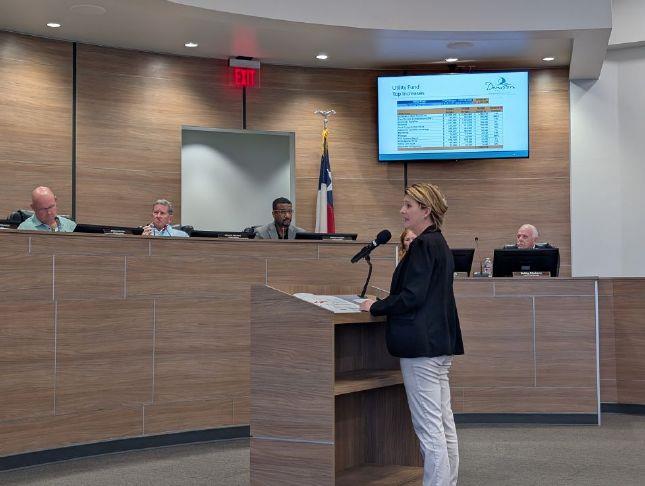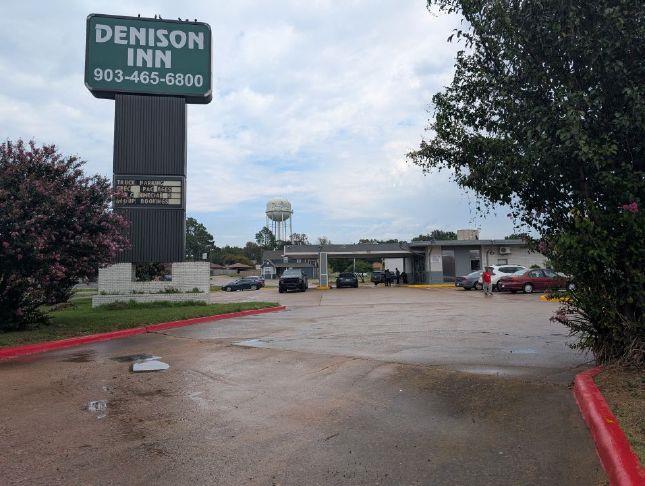As the city of Denison takes the last steps toward drafting a balanced budget for the next fiscal year, some city first responders have been left wanting in the final version of the document.
This week, the Denison City council approved a nearly $77.81 million budget, and a tax rate to support it, for the 2025-2026 fiscal year amid tight finances and increasing demands.
Members of the city council went into Monday’s budget discussions prepared to approve an increase of up to five cents to the city’s property tax rate following budget talks earlier this month. However, the finalized budget featured no increases to the city’s property tax rate of $0.712034 for each $100 of assessed value. Instead, the approved budget included the elimination of grant funding for the hiring and training of firefighters and other compensation for city employees.
The current budget season comes one year after the city council voted to raise property tax rates by six cents in 2024 amid rising costs, increasing inflation and major projects needed to support upcoming growth within the city.
“One of the things that we were looking at was to try not to burden the taxpayers with an additional increase,” Denison Mayor Robert Crawley said on Monday. “We taxed them six cents last year, which we hated to do, but that’s what we did last year. This year, we are trying desperately not to raise the taxes.”
This summer, city officials and representatives for the fire department discussed alternative funding mechanisms for the fire department as a part of the city’s annual budget retreat. During the discussions, Denison Fire Rescue Chief Kenneth Jacks discussed a grant opportunity issued through the Federal Emergency Management Agency. The Staffing for Adequate Fire and Emergency Response, also known as SAFER, could provide matching funds that would allow the city to hire and train additional personnel.
Jacks said the grant could provide about $6.88 million over the course of three years and allow the city to hire 21 new firefighters that would eventually become the crew of Fire Station 4 and cover northwestern portions of the city. This station would eventually be the primary station for the Preston Harbor development as homes were built within the development.
At the time, Jacks estimated the cost to the city for the first year of the grant would be about $573,000 and the grant funding would decrease over time with the city taking on full responsibility for funding the officers in the fourth year. Over time, the grant could provide up to $6.88 million in funding for training and hiring of staff.
The funding for the grant was included in a draft budget presented to the council in late August, but was omitted in the final version that was approved by the council. Representatives for the Denison Firefighters Association and other members of the public noted the absence of cost of living adjustments, which were replaced by a one-time payment, and market rate pay increases for firefighters.
Lee Thornton has previously worked with the city through its fireman’s pension fund board and acknowledged the work that staff put into the budget and the situation Denison finds itself in with regard to tight funding and rising expenses. Still, he said he preferred the previous draft that included compensation for employees.
“I would simply say that this budget I don’t think adequately funds all of our city employees,” he said. “The budget cuts were taken primarily from the fire department, which is an essential service that we have. They have worked extremely hard to achieve that ISO 1 rating, which attracts builders and developers.”
This sentiment was mirrored by Leighton Privette, president of the firefighters association, who noted that the city was working its way through a difficult time when recruiting and retainment of staff, especially firefighters, was difficult amid increasing competition from other communities.
“This package was built with the goal to retain and attract well-qualified employees for the city,” Privette said regarding the omitted compensation. “It is a need that was recognized by city leadership and would benefit the future workers citywide.”
With the removal of increased compensation, Privette said Denison will not be among the lowest paying communities within its peer cities for firefighters.
Mayor Robert Crawley acknowledged the removal of the SAFER grant, but said the decision came amid a reevaluation of the Preston Harbor development and the timetable for construction for the project. He said the project appeared to be behind schedule and the development would likely not need fire services from the proposed fire station 4 as early as initially anticipated.
“To me, the SAFER grant is a timing issue,” he said. We need to get a little farther into the progress of Preston Harbor to know a little bit more of when that timing is to be.”
As such, Crawley argued that it made more sense for the city to wait for construction to begin on the first homes within the development. With this in mind, he said the city plans to reject funding from the grant with the intent to reapply in the future.
“We had heard earlier that there should be some kind of ribbon cutting in the spring,” Crawley said. “That has not happened. We now think that will happen this fall, but that ribbon cutting will be when the homebuilder begins to move forward with his projects.
“There are no homes out there right now, and it is very unlikely that there will be any homes there before the end of next year. So, we felt like that was one place that we could push that expense forward into next year or the year after depending on when the construction actually gets there.”
Council Member Josh Massey agreed that it made more sense to delay progress on, and staffing for, the new fire station to bring it in line with the development of Preston Harbor. While the city could see less than $600,000 in expenses for the first year, Massey proposed a scenario in which the development was pushed back further.
“If Preston Harbor hasn’t shown up yet, then now instead of a $600,000 cost to the city, we now have a $1.2 (million) the following budget year, and ever increasing,” he said. “I would absolutely support every fireman making a quarter-million dollars a year; I think you deserve it, but I can’t get there.”
“If Preston Harbor fails, and we have no lever to force moving forward, then next year we’ve got a $600,000 shortfall and a bunch of guys,” he said.
Jacks said he was concerned that the grant may not be offered in the future, citing concerns over the future of FEMA and pushes to reduce grant spending by the federal government.
Massey noted that increasing staffing for the department could reduce its overtime costs and lead to savings for the city. However, he questioned the viability of this after talking for members of the department who relied on that additional income. Without it, these firefighters could be forced to look for employment elsewhere, Massey argued.
“A lot of them said that is how they make ends meet,” he said. “Working that overtime is how they fund their families.”
Both Privette and Chief Jacks argued that while Preston Harbor and its need for firefighters may have been delayed, the department could make use of the additional manpower now. Privette said additional staff could help relieve some overtime fatigue within the department.
Jacks argued that the additional staff would help bring the department closer to national standards for personnel assigned to each engine. In some cases, Denison currently runs engines with as little as two firefighters, which limits their abilities to effectively perform their jobs during an emergency.
Beyond efficiency, Jacks said he feels that running the engines with less personnel is a safety risk both for the firefighters and the public.
“We ride two up on one of our engines, which is criminal,” he said. “It is setting the city up for failure.”
Both Councilmembers Massey and Aaron Thomas asked representatives for the department to evaluate their priorities between the needs for compensation for existing personnel, new firefighters and maintaining the city’s ISO rating. This rating evaluates a community’s ability to combat and prevent fire and is a tool used by insurance companies to assess insurance rates. In early 2024, the city improved its ISO rating to a one, the highest rating offered.
For Massey, the decision represents the competing needs of city staff and the need to maintain a low tax rate for residents. He asked Privette and the firefighters in attendance which was a high priority and need: higher compensation or additional staff, with those in attendance stating that staff was a higher need.
“I do not want to charge our citizens taxes when they are living in an environment where they are burdened to make ends meet, but that need not diminish any respect I have for your office,” he said.
Thomas asked if there was a point where the expense from maintaining the high ISO rating outweighed the benefit to residents and became unmanageable. He asked Jacks if compensation or the ISO rating is a better marketing tool for the department. Jacks said that compensation was a bigger factor for potential firefighters who are considering Denison.
When put to a vote, the council agreed to approve the budget in a vote of five to two with Massey and Thomas voting in opposition. Crawley called for the creation of a subcommittee to look into the budget for opportunities for the city, but did not specify any specific priorities or timeline for this group.




